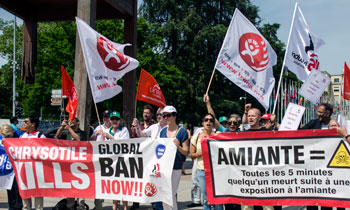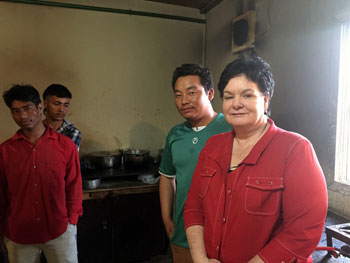

Occupational cancer isn’t a mystery disease. There’s decades of evidence about the causes, and enough early warnings to avoid introducing a new generation of killers. But instead of prevention, we are facing a toxic cocktail of denial and deceit that means more people than at any time in history will develop tumours caused by their job.
The reason is as straightforward as it is shocking. As long as there’s money to be made, industry will retain its fatal attachment to some of the most potent killers in history.
Take asbestos. In May 2015, just enough governments danced to the asbestos industry’s tune to keep chrysotile asbestos off the toxic exports list included in a United Nations treaty for what the industry gloated was “an historical and without precedent” fifth time. This was not about a ban, just warnings that asbestos exports could be bad for you. It is an everyday example of an industry protecting its markets. Global production is not falling, and in some countries, including India, Indonesia and Brazil, consumption has increased.

BAD BUSINESS The asbestos industry has derailed attempts to require a right-to-know duty on all its cancerous products. more
Like asbestos, we’ve known benzene causes cancer for well over half a century. But that’s not stopped the industry defending its use. The biggest names in petrochemicals – British Petroleum (BP), Chevron, ConocoPhillips, ExxonMobil and Shell Chemical – all chipped in to a major study that ran through most of the last decade, designed to head off cancer compensation claims and to protect their valuable product from tighter regulation. It is an industry profit-and-loss calculation where you are the one to lose.
These companies have plenty of allies in government, which means yesterday’s problem is certain to be tomorrow’s too.

GLOBAL PROBLEM ITUC General secretary Sharan Burrow said unions are committed to challenging forcefully labour and safety abuses, including the deadly exploitation of migrant workers in Qatar.
In the US, for example, official proposals to tighten exposure limits for even the most deadly substances languish in arcane consultative processes industry interests string out for decades. It exposes a regulatory sensitivity to unsubstantiated business scaremongering partnered with a desperate insensitivity to the substantial human cost and scary – deadly – consequences this regulatory inertia demands.
Wherever stricter controls are proposed, industry representatives or their hired guns appear, challenging the science and predicting an economic catastrophe. It’s a cynical but frequently successful ruse, and it means the real catastrophe is usually human.
The International Labour Organisation (ILO) puts the resulting occupational cancer toll at in excess of 660,000 lives a year; many believe it is considerably higher. It is an epidemic guaranteed to continue for at least one more generation, as today’s exposures only reveal their cancerous legacy decades down the line.
Whether it is silica or diesel exhaust, dyes or metals, alternatives are not being used and controls are not being applied. Instead, new industries make the same old mistakes. Samsung apologised in 2014 after its hi-tech production lines were found to have cancers of the blood as a by-product.
It took until September 2014 for Apple, the world’s most profitable company, to agree to remove benzene from just some of its production processes.
The official statistics indicate cancer is a largely blue collar, largely male concern. But the statistics, like industry, do not tell the whole truth. For example, endocrine disrupting chemicals have been implicated in the higher breast cancer rates found in women in a range of industries including agriculture, plastics, food packaging, metal manufacture and the bar and gambling industries. The industry response wasn’t to back prevention calls, it was to marshal its favourite scientists to challenge calls for tighter regulation. Prevention is off the agenda, and for now the bodies of those women affected in every sense do not count.
Cancer is not part of the pay packet unions are willing to accept. In 2007, Global Unions launched a Zero Work Cancer campaign. It spurred activities at national and international levels to expose the causes of occupational cancer while creating renewed pressure for better laws and prevention strategies.
In Spain, CC.OO launched its own Zero Cancer at Work campaign. In Australia, the national union federation ACTU did likewise, running an ongoing series of seminars across the country. Unions in Europe pressed for improved laws and new, tighter limits on 50 known carcinogens. It continued a union tradition going back decades, including US union UAW’s declaration of ‘war on cancer’ in 1980 and Unifor’s ‘Devil of a poison’ campaign in Canada. These have seen unions refuse to work with some of the worst offenders and press for safest work practices with the rest. These have seen unions refuse to work with some of the worst offenders and press for safest work practices with the rest.
Hazardous exposures at work, from infections like Ebola to pesticides and solvents, kill far more than workplace ‘accidents’. ILO estimates around 2.3 million people each year die worldwide as a result of their jobs. Out of that total, 2 million die from occupational diseases, with circulatory disorders, cancers and lung diseases the top workplace killers.
A new ITUC guide, ‘Toxic work – stop deadly exposures today’, set out why we want to remove toxic exposures from the workplace and how. At the centre of the union strategy is active, union-supported workforce participation, in finding problems and implementing solutions. A new ITUC-supported workplace cancer website, www.cancerhazards.org, now provides union representatives with the latest news on occupational cancer, including emerging scientific evidence and union initiatives to combat this workplace scourge.

STAND UP Union, safety and environmental advocates stood behind Indian asbestos disease victim Sharad Vittnal Sawant as he addressed the UN Rotterdam Convention conference in May 2015. He said: “I have worked for 40 years at the factory Hindustan Ferodo [now Hindustan Composites], which uses chrysotile asbestos. I am suffering from asbestosis and my wife as well. Another 400 of my colleagues have been diagnosed as well. I came here to request you to put chrysotile asbestos in the PIC List of the Rotterdam Convention.” Four countries, led by Russia, ensured this did not happen.
There is nothing inevitable about toxic exposures at work. Over 40 countries, including all those in the European Union, function entirely happily without asbestos. Why shouldn’t workers in India, Brazil or Sri Lanka be afforded the same protection, the same respect for their health?
A May 2015 paper in the journal Respirology warned of an ‘Asian tsunami’ of asbestos disease as the industry continues a high-cost, low-ethics sales drive. They won’t be the victims of bad luck, they will be the victims of bad – criminal - corporate behaviour.
Let me put it like this. Some of the world’s most profitable companies are not just defending their toxic products, they are defending weak exposure standards that mean they profit and you pay.
It is not ethical, it is not healthy and it is not what we bargained for. We make this pledge – if they expose us, we will expose them.
ITUC health and safety webpages
ASBESTOS INDUSTRY CELEBRATES BUSINESS AS USUAL |
|
Dead serious
Occupational cancers kill at a rate of more than one a minute worldwide. Most could be stopped with minimal effort. Sharan Burrow, general secretary of the global union confederation ITUC, says this preventable waste of life must end and is warning rogue employers: “If you expose us, we’ll expose you.”
Related stories
• Asbestos industry celebrates business as usual
Hazards webpages
Deady business • Chemicals
